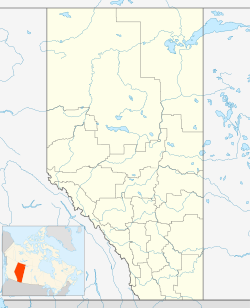Morrin, Alberta
| Morrin | |
|---|---|
| Village | |
| Village of Morrin | |
| Coordinates: 51°39′30″N 112°45′59″W / 51.65833°N 112.76639°WCoordinates: 51°39′30″N 112°45′59″W / 51.65833°N 112.76639°W | |
| Country |
|
| Province |
|
| Region | Southern Alberta |
| Census Division | No. 5 |
| Municipal district | Starland County |
| Incorporated | |
| • Village | April 16, 1920 |
| Government | |
| • Mayor | Suzanne Lacher |
| • Governing body | Morrin Village Council |
| Area (2011) | |
| • Total | 0.82 km2 (0.32 sq mi) |
| Elevation | 832 m (2,730 ft) |
| Population (2011) | |
| • Total | 245 |
| • Density | 298.9/km2 (774/sq mi) |
| Time zone | MST (UTC-7) |
| Highways | 27, 9, 56 |
| Waterways | West Minchichi Creek, Red Deer River |
Morrin is a village in central Alberta, Canada. It is located 26 km north of the town of Drumheller, along Highway 27 and the Railink Central Western railway.
The Morrin Bridge Provincial recreation area is located 10 km west of the village, in the Red Deer River valley, and Dry Island Buffalo Jump Provincial Park is located 40 km north.
Morrin was originally named "Blooming Prairie" but was renamed Morrin in honour of the engineer of the first train to the village.
In the 2011 Census, the Village of Morrin had a population of 245 living in 112 of its 129 total dwellings, a -3.2% change from its 2006 population of 253. With a land area of 0.82 km2 (0.32 sq mi), it had a population density of 298.8/km2 (773.8/sq mi) in 2011.
In 2006, Morrin had a population of 253 living in 122 dwellings, a 0.4% increase from 2001. The village has a land area of 0.82 km2 (0.32 sq mi) and a population density of 308.6/km2 (799/sq mi).
...
Wikipedia

